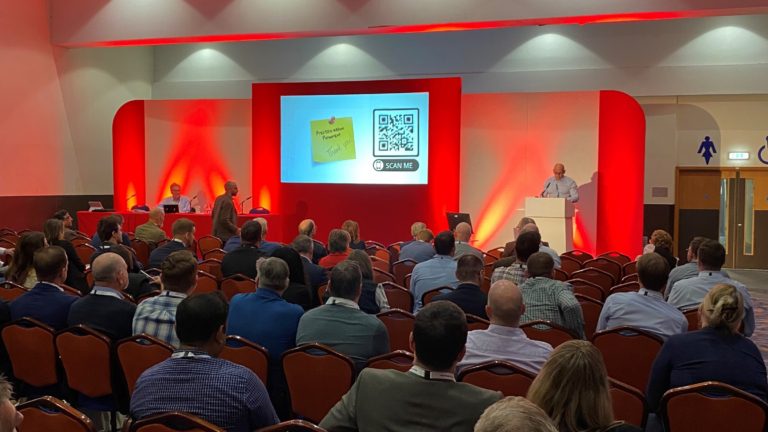
Simon is an experienced performance development specialist and behaviour change psychologist, and has made a significant contribution to individuals, teams and organisations in the business, sports, education, and voluntary sectors. Simon’s speciality is to inspire audiences by igniting the potential that lies within us all and he has a passion for enabling performance improvement.
Simon reflects on his talk at the conference: “I was recently invited to speak at the Tank Storage Association annual conference. I had the pleasure of addressing a large audience of professionals on a subject that is affecting every sector and, especially, this one.
“The subject I discussed is not a new one as it happens every time another generation enters the human capital market. So, why is this time any different, and why the need for the address?”
The generational difference of your employees
“Well, this time, the generational difference is greater, and more challenging, than ever before in the history of generation classification.
“Right now, you will probably employ five generations within your workforce – ranging from mid-60’s through to new entrants at 17 years of age. In fact, 85% of the global workforce is populated by 21-43-year-olds. Again, this doesn’t sound so strange, as this has always been the case, it is simply that, now, there is a stark difference within this age demographic, let alone those younger and older. And this population has different expectations of their work life than those currently working out their careers as they approach retirement.
“The global pandemic has also affected the motivation of the younger generation – and none more so than the new entrants who will arrive by 2030, less than seven years from the date of this article.
“Here are 6 pragmatic tips your organisation can take and implement to be fit for purpose in attracting, training and retaining in the 21st Century…”
1. Cultural audit
There is no point spending time, effort and money attracting new employees if your culture is not fit for purpose. This is like pouring water in a cup with a hole in the bottom, it’s a tiresome task with no return on investment.
Leaders, stop leading from the boardroom, get back to the frontline at least once a quarter so you understand the business from the people who make it happen. Visual leadership is not only advantageous, but also expected.
The main difference between your generation and those born in the last 26 years is their relationship with work. The younger generation want to enjoy their work. They want to thrive, flourish, and make a difference. Stop using the word ‘compensation’ to describe what an employee will get if they work for you! The positioning is all wrong.
Does your culture support this or will they be met with ‘mood hoovers’ from the first day on the job?
2. Obstacle removal
Traditional entry level qualifications are obstacles that get in the way of attracting the future of your organisation. More globally recognised companies are reducing, or even removing, the requirement for a degree qualification to join them as there is little evidence of relevance to the job they are applying for.
Of course, there are exceptions to the rule but, typically, the in-house development is far more relevant than the degree they attained at any University.
3. Think differently about traditional practises that may no longer be fit for purpose.
Job descriptions tend to restrict what the entrant does in your organisation when they, and you, don’t know where their strengths lie.
Consider a tour of duty where new entrants work in different areas within your business, so that they understand the value chain, appreciate the collective contribution and find where they fit – both in terms of interest and the motivation to deliver.
4. Alignment
With the younger generation wanting to make a difference to the world, align your recruitment to their purpose.
Tap into the future sustainability of what you do and how you will be contributing to a better world. Express your desire to hire people who are passionate about this and how you want to explore their ideas and enable global betterment. Instantly there is a connection, but this can only succeed if you take note and action the first tip above.
5. Video-based learning
Whilst some learning and training is still best absorbed face to face in real time, the world has become infatuated with learning via digital platforms. YouTube is by far the most widely used platform for finding out anything – from changing a plug to installing a reverse osmosis water system – and almost everything else as well.
So why not utilise this obsession and create video-based learning for your standard operating procedures as well as the basic departmental practises? It is relatively inexpensive and enables quick answers with minimal bottle necks whilst increasing everyone’s efficient productivity.
6. Grow your own
Sadly, the decline of STEM schools, and the changing education system, mean that many young apprentices, or new entrants, lack the skills needed for the roles you must fill. You will need to proportion a greater amount of your budget to growing your own talent by utilising the knowledge, skills, and experience of existing grandparents (an affectionate name for the wiser employees within your organisation).
Train this more established generation in how to interact and develop the younger generation and create interactive learning and development. Start with structured work experience for school pupils as well as internships for interested higher education students and progressive programmes with relevant qualifications for apprentices.
We have assisted many different organisations to create their own internal Academies with disciplines aligned to career maps and succession management.
No single generation has all the answers, despite what they might think. The meeting of minds allows greater understanding and the best ways forward. This can only happen when both parties appreciate the other and there is a mutually agreed purpose to achieve.
Don’t be one of those people that sounds like their dad complaining about the youth of today. Listen, learn, and educate in equal measures to create a sustainable future for your organisation, sector and the world.
Simon Thorpe – Expressions Partnership
Simon is the managing director of The Expressions Partnership – a professional team of passionate people with a central ambition to help individuals, teams and organisations improve performance. The organisation designs and delivers learning and development training programmes including one-to-one coaching, group workshops, large scale seminars and blended learning options on a range of subject areas.
https://expressionspartnership.com/
